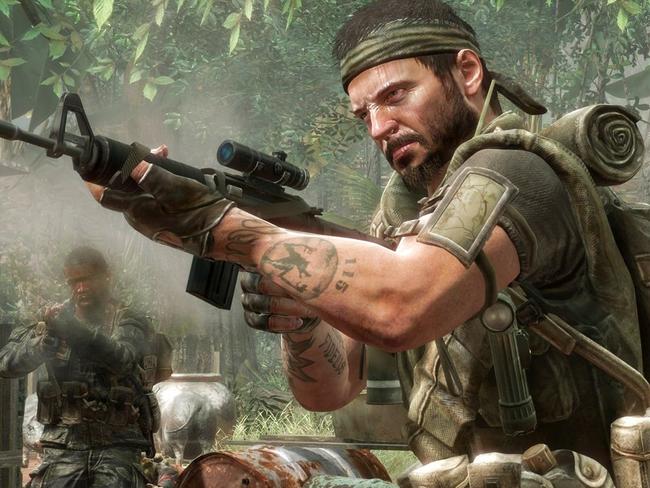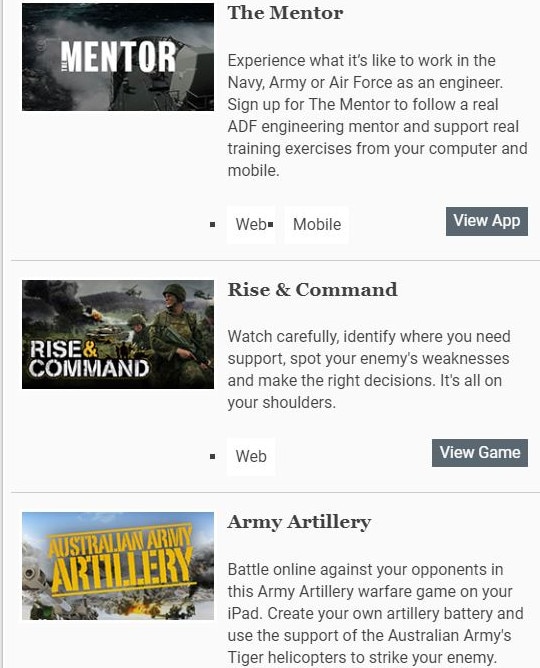Gaming the military: The ongoing but often fraught relationship between the gaming and defence industries
FOR a government looking for recruits to join the military, the gaming is an obvious hunting ground. It doesn’t always work out.
Gaming
Don't miss out on the headlines from Gaming. Followed categories will be added to My News.
IN MANY ways it makes perfect sense.
For a government looking for young people, particularly men, willing to join the military and face possible combat, teens and adults playing Call of Duty seem like the perfect candidates.
In what is sometimes described as a military-entertainment complex, video games have become useful tools for propaganda, recruitment and training for the defence forces. Countries including the United States and Australia have a long history of leveraging the gaming industry to boost the armed services, particularly when looking for new recruits.
Monash University ethicist, Professor Rob Sparrow has explored the strong link between the defence industry and gaming.
“I don’t think they’re looking for the skill set as much as the receptiveness to the message. If you’re fantasising about this stuff (war games) it might seem plausible that you would be willing to do it in real life,” he told news.com.au.
“The military is also aware that gaming is one of the main forms of media consumed by young people.”
As well as recruitment, using games to teach military tactics has been a longstanding practice. Historian and English professor Corey Mead’s 2013 book War Play: Video Games and the Future of Armed Conflict detailed how the relationship between the US military and video games goes back multiple decades.
The military has used video games “at every organisational level for a broad array of purposes,” he wrote. The use of video games have served three main aims: to recruit soldiers, to train them and, most recently, to treat their psychological disorders such as PTSD.

The Australian Defence Force (ADF) has very much followed suit in cosying up to the gaming industry to reap the apparent benefits.
The ADF has previously sought the next generation of soldiers by buying advertising space on popular gaming review websites like IGN and Neoseeker that feature military-style video games.
The ads would appear alongside reviews displaying messages like “Experience military training”, “Make new friends” and “Earn a great salary”.
But the close relationship doesn’t always bear fruit.
This week the Australian Department of Defence came under fire for spending taxpayer money to pay young gaming “influencers” to promote the armed forces on social media. The commercial relationship was ended after The Daily Telegraph uncovered a string of misogynistic and violent tweets the young men had previously posted online, including jokes about rape.
The department’s attempt to use specifically made online games to give users a taste of what it’s like to be in the military has also been abandoned in recent years after being deemed a failure.
The “gaming and apps” page on the Australian Defence Department’s website still contains the defunct links to games like Army Artillery, Rise & Command and The Mentor.
“Experience what it’s like to work in the Navy, Army or air force as an engineer,” proclaims one game. But the page no longer exists.
“Defence Force Recruitment previously used games as a recruitment tool to attract interest in joining the Australian Defence Force,” a spokesperson told news.com.au.
However, the applications were removed between 2016 and 2017 “as they were no longer achieving the marketing and attraction objectives of Defence Force Recruiting,” they said.

The effectiveness of video games to change behaviour and train soldiers still comes under dispute.
In a previous paper titled Playing for Fun, Training for War, Prof Sparrow and other researchers at Monash University tried to explore the apparent contradiction between the fact that defenders of violent video games often characterise them as harmless fun, while the military continues to tout their utility in training skills and transforming the character of war fighters.
“If this apparent contradiction cannot be resolved we will have to choose between admitting that video games do shape the dispositions of those who play them or that the claims made for their utility in military training are wildly exaggerated,” the paper stated.
“What I wanted to point out was that someone had to be wrong, you can’t have it both ways,” Prof Sparrow told news.com.au.
However, from a cultural perspective he thinks the celebration of war in popular culture, and particularly in video games, can have impact on people’s willingness and ability to volunteer for conflict.
To some extent and for some people, he said, “the culture of militarism that is spread by video games does make it easier to kill”.
— Additional reporting by Rhian Deutrom
Originally published as Gaming the military: The ongoing but often fraught relationship between the gaming and defence industries



